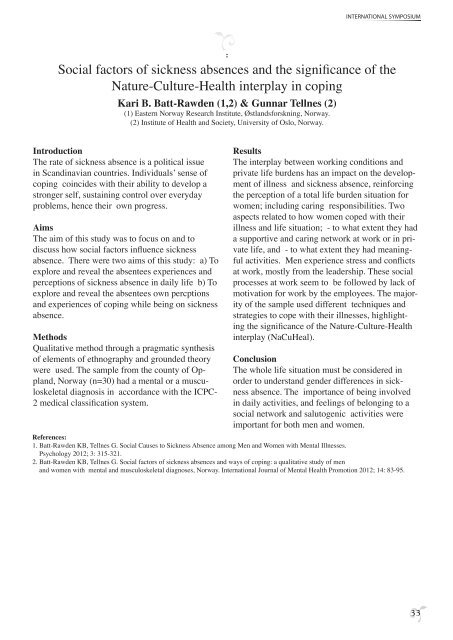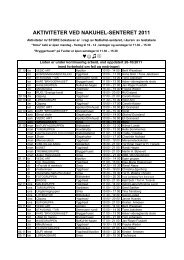Natur og Kultur som Folkehelse - NaKuHel
Natur og Kultur som Folkehelse - NaKuHel
Natur og Kultur som Folkehelse - NaKuHel
You also want an ePaper? Increase the reach of your titles
YUMPU automatically turns print PDFs into web optimized ePapers that Google loves.
INTERNATIONAL SYMPOSIUM<br />
:<br />
Social factors of sickness absences and the significance of the<br />
<strong>Natur</strong>e-Culture-Health interplay in coping<br />
Kari B. Batt-Rawden (1,2) & Gunnar Tellnes (2)<br />
(1) Eastern Norway Research Institute, Østlandsforskning, Norway.<br />
(2) Institute of Health and Society, University of Oslo, Norway.<br />
Introduction<br />
The rate of sickness absence is a political issue<br />
in Scandinavian countries. Individualsʼ’ sense of<br />
coping coincides with their ability to develop a<br />
stronger self, sustaining control over everyday<br />
problems, hence their own pr<strong>og</strong>ress.<br />
Aims<br />
The aim of this study was to focus on and to<br />
discuss how social factors influence sickness<br />
absence. There were two aims of this study: a) To<br />
explore and reveal the absentees experiences and<br />
perceptions of sickness absence in daily life b) To<br />
explore and reveal the absentees own percptions<br />
and experiences of coping while being on sickness<br />
absence.<br />
Methods<br />
Qualitative method through a pragmatic synthesis<br />
of elements of ethn<strong>og</strong>raphy and grounded theory<br />
were used. The sample from the county of Oppland,<br />
Norway (n=30) had a mental or a musculoskeletal<br />
diagnosis in accordance with the ICPC-<br />
2 medical classification system.<br />
Results<br />
The interplay between working conditions and<br />
private life burdens has an impact on the development<br />
of illness and sickness absence, reinforcing<br />
the perception of a total life burden situation for<br />
women; including caring responsibilities. Two<br />
aspects related to how women coped with their<br />
illness and life situation; - to what extent they had<br />
a supportive and caring network at work or in private<br />
life, and - to what extent they had meaningful<br />
activities. Men experience stress and conflicts<br />
at work, mostly from the leadership. These social<br />
processes at work seem to be followed by lack of<br />
motivation for work by the employees. The majority<br />
of the sample used different techniques and<br />
strategies to cope with their illnesses, highlighting<br />
the significance of the <strong>Natur</strong>e-Culture-Health<br />
interplay (NaCuHeal).<br />
Conclusion<br />
The whole life situation must be considered in<br />
order to understand gender differences in sickness<br />
absence. The importance of being involved<br />
in daily activities, and feelings of belonging to a<br />
social network and salut<strong>og</strong>enic activities were<br />
important for both men and women.<br />
References:<br />
1. Batt-Rawden KB, Tellnes G. Social Causes to Sickness Absence among Men and Women with Mental Illnesses.<br />
Psychol<strong>og</strong>y 2012; 3: 315-321.<br />
2. Batt-Rawden KB, Tellnes G. Social factors of sickness absences and ways of coping: a qualitative study of men<br />
and women with mental and musculoskeletal diagnoses, Norway. International Journal of Mental Health Promotion 2012; 14: 83-95.<br />
33





